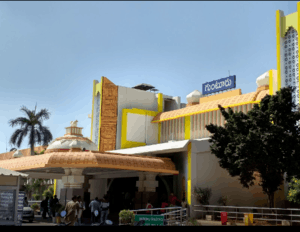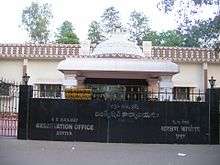Guntur Junction railway station
Guntur junction railway station | |||||||||||||||||||||
|---|---|---|---|---|---|---|---|---|---|---|---|---|---|---|---|---|---|---|---|---|---|
 Guntur Junction railway station | |||||||||||||||||||||
| Location |
Guntur, Guntur district, Andhra Pradesh India | ||||||||||||||||||||
| Coordinates | 16°18′03″N 80°26′34″E / 16.3008°N 80.4428°ECoordinates: 16°18′03″N 80°26′34″E / 16.3008°N 80.4428°E | ||||||||||||||||||||
| Operated by | Indian Railways | ||||||||||||||||||||
| Line(s) | Guntur-Tenali section, Guntur-Krishna canal section, Nallapadu- Pagidipalli section, Nallapadu-Guntakal section | ||||||||||||||||||||
| Platforms | 7 | ||||||||||||||||||||
| Construction | |||||||||||||||||||||
| Structure type | On ground | ||||||||||||||||||||
| Parking | Available | ||||||||||||||||||||
| Disabled access |
| ||||||||||||||||||||
| Other information | |||||||||||||||||||||
| Station code | GNT | ||||||||||||||||||||
| Zone(s) | South Central Railway | ||||||||||||||||||||
| Division(s) | Guntur | ||||||||||||||||||||
| History | |||||||||||||||||||||
| Opened | 1 April 2003 | ||||||||||||||||||||
| Services | |||||||||||||||||||||
| |||||||||||||||||||||
Guntur railway station (station code:GNT)[1] is an Indian railway station in Guntur of Andhra Pradesh. It is situated on Krishna Canal-Guntur section of Guntur railway division in South Central Railway zone.[2][3] It is 295th most busiest railway station in India.[4]
History
The first rail lines in Guntur are of Metre Gauge line opened Guntur-Repalle section in year 1916[5] and later between Guntur and Hubli/Goa.Later a Broad Gauge rail line was built between GNT/VJA towards Howrah with the completion of Prakasam Barrage on River Krishna. By the end of the 20th century Guntur had 4 different railway lines passing through its junction.That railway lines is Guntur-Tenali section, Guntur-Vijayawada section, Guntur-Nallapadu-Guntakal section, Guntur-Nallapadu-Pagidipalli section.
Structure and amenities

The station is spread over an area of 43,146 m2 (464,420 sq ft), maintained by 32 employees.[2] There are a total of seven platforms with inter-connected subway system. The station has East and West terminals equipped with reservation counters. It has 2 pit lines for primary maintenance of Trains originating from here.Palnadu Express, Simhadri Express, Golconda Express and some other passenger trains are maintained here.
Classification
Guntur Junction railway station is an A–category station. It is recognized as a Model station, Adarsh station and Touch & Feel (Modern Stations) in the Guntur railway division.[6]It is identified and selected by central government as one of the station to be developed with international standards in the state of Andhra Pradesh. A budget of Rs.25 crores sanctioned for this purpose.[7]
Performance and earnings
On an average, the passenger traffic of the station stands at 25,438 per day. Everyday, a total of 44 express, 46 passenger and 18 EMU/DMU trains halt at the station. The station annually handles 7.01 MT of cargo and the average income generated by freight transport is ₹20.736 million (US$290,000).[2]
The below table lists the passenger earnings of the station of the previous years.[2][8]
| Year | Earnings (in Lakhs) |
|---|---|
| 2011-12 | 3467.30 |
| 2012–13 | 3648.00 |
| 2013–14 | 4523.27 |
| 2014–15 | 4980.39 |
See also
References
| Wikimedia Commons has media related to Guntur Junction railway station. |
- ↑ "Station Code Index" (PDF). Portal of Indian Railways. p. 45. Retrieved 31 May 2017.
- 1 2 3 4 "Evolution of Guntur Division" (PDF). South Central Railway. p. 9,11. Retrieved 30 November 2015.
- ↑ "Station: Nellore". South Central Railway – Indian Railways. Retrieved 10 November 2016.
- ↑ "BUSIEST TRAIN STATIONS INDIA".
- ↑ Andhra Pradesh District Gazetteers: Guntur by Andhra Pradesh (India), Bh Sivasankaranarayana, M. V. Rajagopal – 1977 – Page 188 In the years that followed, railway lines connecting Madras to Vijayawada (via) Tenali (1 898), Guntur to Repalle (1916) and Guntur to Macherla (1930) were opened.
- ↑ "Guntur Division" (PDF). South Central Railway. pp. 9, 11. Retrieved 18 January 2016.
- ↑ "కేంద్ర ప్రకటన: ఏపీలోని 4 రైల్వే స్టేషన్లకు అంతర్జాతీయ హోదా". https://telugu.oneindia.com (in Telugu). Retrieved 2018-04-04. External link in
|work=(help) - ↑ "GUNTUR JN".

